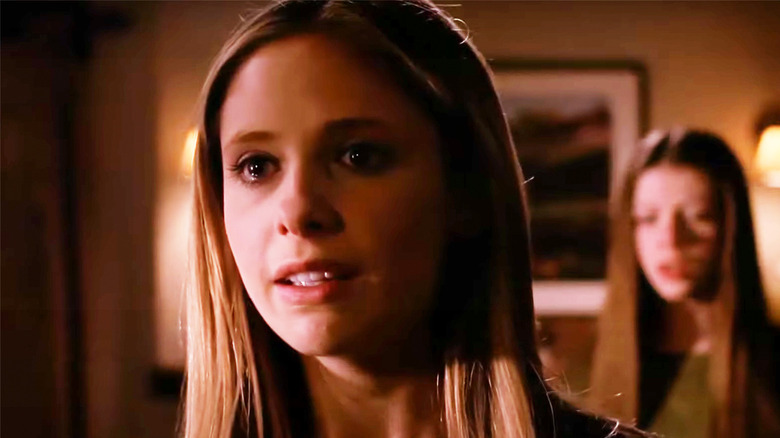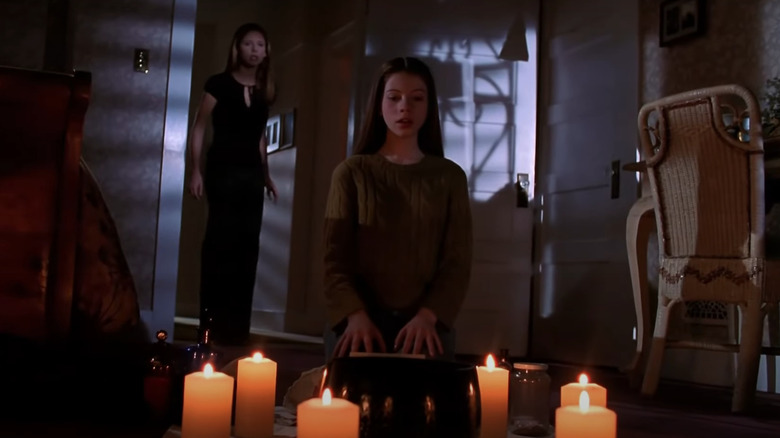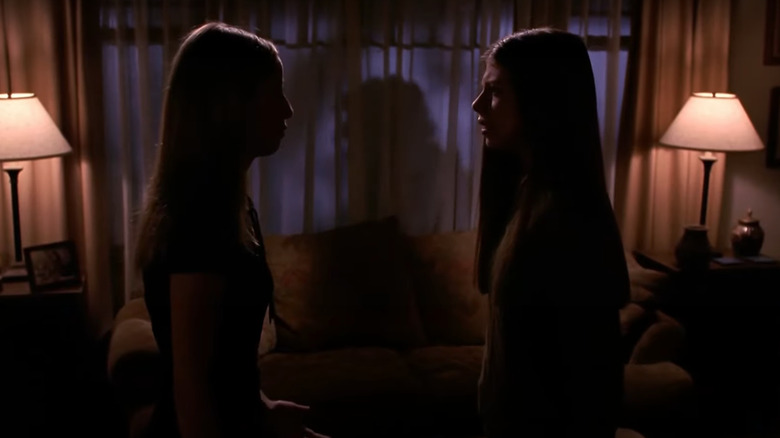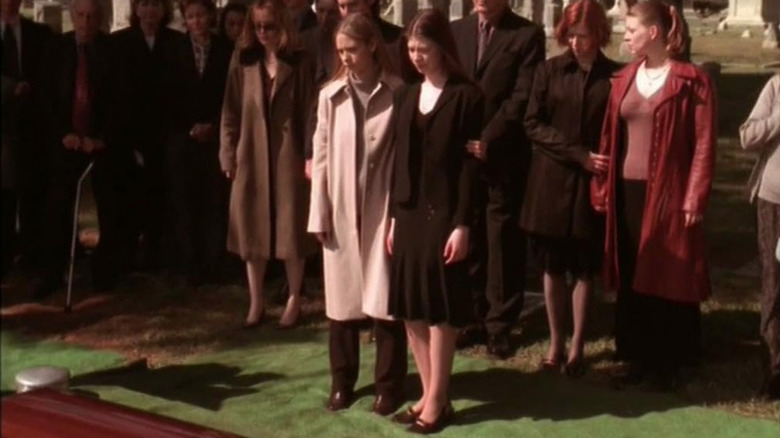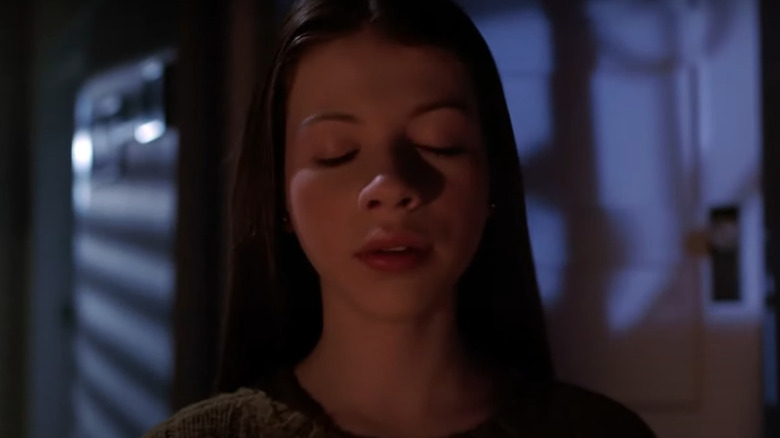The Creepiest Episode Of Buffy The Vampire Slayer Still Freaks Us Out Decades Later
If you've ever seen a list of the spookiest "Buffy the Vampire Slayer" episodes, you've probably seen installments such as "Nightmares" or "Buffy vs. Dracula" regularly cropping up. It also seems that fans are pretty much united in their view that the scariest episode of "Buffy" is "Hush."
There's no doubt those grinning villains, known only as "The Gentlemen," were a powerful image, and perhaps the most iconic antagonists of the entire series. The concept of the episode, too, is pretty unsettling, with all the residents of Sunnydale losing their voices, leaving them unable to scream as The Gentlemen go about their diabolical mission of extracting human hearts.
But there's one episode of "Buffy" that remains truly haunting in a way that "Hush," or any episode for that matter, never quite was. This one doesn't necessarily have a memorable villain, but it's about as creepy an episode of the show as you'll ever see.
Forever
"Forever" is the seventeenth episode of "Buffy" season 5, coming immediately after we'd all been traumatized by the previous episode, "The Body." That installment opened with one of the most emotionally affecting moments in the show's history, with Buffy returning home to find her mother, Joyce (Kristine Sutherland), lying lifeless on the couch. It's the episode Sarah Michelle Gellar can't watch, and according to show creator Joss Whedon, the best thing he's ever done.
"Forever" is the follow-up, and sees Buffy, her sister Dawn (Michelle Trachtenberg), and their friends still grappling with the loss of Joyce. After her mother's funeral, Dawn reveals she wants to cast a resurrection spell, but is advised against it by pretty much everyone else. Spike (James Marsters), however, agrees to help and takes Dawn to a magic expert named Doc, who warns her that Joyce might not "come back exactly like she was." Before Spike and Dawn leave his house, Doc's eyes go black, suggesting he might not have been as altruistic and congenial as he'd seemed.
Despite being repeatedly warned against the spell, Dawn pushes ahead. As things come to a climax, Buffy confronts her sister, who accuses her of withdrawing since her mother's death and not being there for support. They argue, with Buffy telling Dawn, "Who knows what you actually raised, what's going to come through that door?" Then, a shadowy figure passes the window in the background, suggesting the resurrected Joyce has arrived. A knock on the door interrupts the girls, but as Buffy runs to answer it, Dawn rips up a photo of her mother, ending the spell as the door opens to an empty porch. All of which leaves us to imagine what kind of ungodly zombie atrocity awaited us before Dawn tore the photo.
The horror in your head
"The Body" is devastating. You could even say it's scary in its unflinching depiction of loss and the unforgiving nature of grief. But for whatever reason, it didn't stay with me the way "Forever" did. I saw both episodes when they first aired in the UK in 2001, and more than 20 years later, I still think about "Forever" and its tumultuous climax
Recently, I wrote about the ending of "Seven" and how the film provokes the audience by leaving certain details up to their imagination. Most infamously, we never see the head in the box during the film's brutal finale. But David Fincher's 1995 crime thriller also neglects to show you any of the actual "seven deadly sin" murders taking place, forcing us to imagine the acts themselves.
Inspired by living in New York City in the '80s and witnessing widespread crime and social decay, writer Andrew Kevin Walker wrote "Seven" as a way of exploring how apathy and insouciance can allow the kind of degradation he witnessed proliferate. By prompting the audience to imagine all these gruesome scenarios, Walker left them no choice but to finally pay attention. Viewers can't ignore something that unfolded exclusively inside their own minds, after all.
With "Forever," writer and director Marti Noxon pulled a similar trick. We never get a real look at whatever it was that cast such an ominous shadow on the window, and the episode is so much more hauntingly effective as a result. It's helped by the fact that Noxon expertly set up that climax throughout the episode, having characters repeatedly warn Dawn against casting the spell and establishing an uneasy atmosphere that builds towards the deeply unsettling finale.
Supernatural reality
A couple of decades or so after "Forever" first aired, I'm still creeped out by that shadow passing the window. I saw every episode of "Buffy" back in the late-'90s/early 2000s, and did a rewatch in 2010, and neither "Hush" nor "The Body" managed to occupy a permanent place in my memory the way "Forever" did. As such, I'd argue it's not only one of the creepiest, it's one of the best ever episodes of "Buffy." And I think that's about more than forcing the audience to imagine what awaited on the other side of Buffy's front door.
Speaking about the episode to the BBC, Marti Noxon said:
"To me, the show always is the most affecting — this is just my personal feeling — but the show's always the most affecting when the supernatural element rings very true to something someone would do or want in their life."
The desire to overcome death has to be one of the most common human impulses. And not in the weird transhumanist, "eccentric billionaire who wants to be cryogenically frozen" kind of way. But anyone who's lost someone they love will know that feeling of disbelief, of not wanting to accept the reality of the situation. Noxon tapped into that with "Forever," simultaneously validating the impulse to negate the finality of death and showing the folly of such ambitions. By the time Dawn succeeds in resurrecting her mother, everyone, including the audience, knows that there's something fundamentally wrong with what's happening. It just feels off, which not only heightens our fear of what that sinister shadow behind the curtain could have been, it forces us to reckon with the fact that no matter how violently our minds reject it, death cannot be overcome. And that's my message of hope for today.
Uplifting horror
I'm aware this is all a bit morbid, but there's an uplifting note among all this talk of the finality of death and hideous zombie creatures lurking in the shadows. The great thing about "Forever," beyond its impressive power to creep us all out, is that it reminds us of film's (or, in this case, TV's) enduring ability to leverage the power of our own imaginations in ways other art forms simply can't. I still wonder what would have been on the other side of Buffy's front door had Dawn not ripped the photo, but more importantly, I'm still creeped out by what my own imagination came up with to fill that gap.
On an even grander scale, exploring this pervasive impulse we all have to somehow cheat death, and delivering such an emphatic retort with that haunting finale makes "Forever" a powerful piece of art, and a testament to the ability of art to affect us so deeply. That's a great thing! And an oddly comforting one, too, in the way it affirms our collective desire to keep the people we love around, even as it acknowledges the futility of it all.
The upcoming "Buffy" sequel series is set to hit Audible in October 2023, and I'm hoping it retains the show's remarkable ability to meld the supernatural with real-world issues when it debuts, potentially leaving us traumatized for decades once again.
